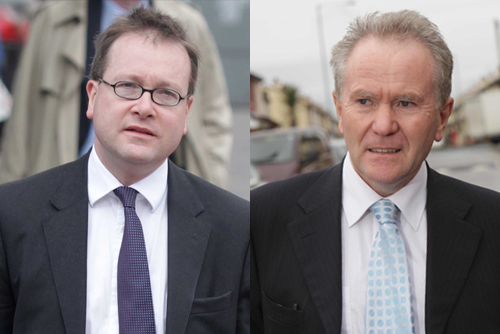BY BARRY McCAFFREY
NORTHERN Ireland’s Senior Coroner John Leckey will tomorrow (Monday) formally abandon a decision to suspend 21 Troubles-related inquests which he had previously halted over concerns of national security.
In November Mr Leckey announced that he was issuing a “blanket suspension” stopping the inquests on the grounds that the Northern Ireland Attorney General John Larkin QC, who had ordered inquests into the security force killings, had exceeded his legal powers.
Mr Leckey raised doubts over whether Mr Larkin had the power to order inquests in to deaths which may potentially have national security concerns. Such cases instead are the domain of the Advocate General for England and Wales Dominic Grieve QC.
Following the coroner’s decision, a legal challenge against the suspension was lodged by four of the families of those involved. The suspension was subsequently temporarily lifted after a court hearing in December pending a full judicial review; however the coroner’s office continued to oppose the families’ legal action.
Now the Detail understands that legal counsel for Mr Leckey will confirm on Monday that he will no longer contest the families’ challenge against the suspension.
The move comes after the Advocate General’s office informed Mr Leckey that it believed Mr Larkin had been legally entitled as attorney aeneral to order inquests into the deaths.
In a letter to the senior coroner, the Advocate General’s office wrote:
“The view held here is that there is nothing in section 14 of the 1959 (Coroners NI) Act, as amended, that prevents the Attorney General for Northern Ireland from directing a new inquest, if on the basis of what he has seen, he considers a new inquest advisable.
“The test imposed by the section has a very low threshold and the degree of discretion given to the Attorney General very broad.
“We believe in the absence of a certificate from the Secretary of State, issued under sub-section 2, any direction given by the Attorney General is on the face of it lawful.
“We agree that if the Attorney General for Northern Ireland in reaching a decision to direct a new inquest does so knowing that there is information relevant to his decision that he has not taken into consideration then, in keeping with general public law considerations, his decision may be subject to challenge but we do not think section 14, as amended, can be read to place a duty on the Attorney General to draw cases to the attention of the Secretary of State.
“I would also add that whilst the test, sub section 2, imposes on the Secretary of State requires her to consider whether the disclosure of information “may be against the interest of national security” that is not a matter that the Advocate General could take into account if the matter was transferred to him.”
The Detail understands that the families of 11 people shot dead by British soldiers in Ballymurphy in 1971 were informed by the Secretary of State Theresa Villiers during a meeting on January 31 that legal opinion she had received did not support the coroner’s decision to suspend the inquests.
Confirming the Secretary of State’s support for the resumption of the inquests, an NIO spokeswoman said:
“The Secretary of State responded to the request from the Coroners’ Service to clarify her interpretation of the legislation. She did not raise any legal objection to these inquests being resumed.”
A spokeswoman for the Coroner’s Service said: “I can confirm that the Advocate General has written to Mr Leckey and the letter has been disclosed to the Court and the parties.”
